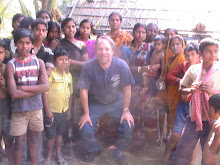Narendra Modi's Game Changing Action Part II
World leaders from the US to Europe and Asia all claim to be fighting the scourge of terrorism. (US President Barack Obama refuses to call it what it is, radical Islamist terrorism, but that is what they all are fighting.) One near constant of this fight against Islamists has been the reactive nature
of their actions. A terrorist tries to blow up a plane with his shoe, and now we have to take off our shoes at the airport. Terrorists try to use liquid explosives to blow up planes going from the UK to the US, and we have to restrict the size of liquids in our carry-on baggage. And so on and so on. They act; we react. In this war so far, the bad guys usually set the agenda, and we allow them to do it.
On May 26, 2014, all that changed when Narendra Modi was elected India's Prime Minister in a landslide for his Bharatiya Janata Party (BJP). Perhaps not immediately. In fact, Modi began his tenure as PM with an unprecedented gesture of friendship by inviting Pakistani Prime Minister Nawaz Sharif to his inauguration and for meetings that would hopefully usher in a new era of Indo-Pak cooperation. Unfortunately, despite Modi's gesture of friendship, the Pakistanis continued their provocations against their neighbor, and the latest attacks in Uri, Kashmir were the final straw. They had supported anti-Indian terrorism before during Modi's tenure, but the Uri attacks went to far.
The day after I predicted he would, Modi ordered pinpoint strikes against the Lashkar e-Taiba terror camps in Pakistan occupied Kashmir. Lashkar has been operating freely with the Pakistani government's tacit and sometimes active support, and Modi's actions sent a strong message to the Pakistanis that--unlike his predecessors--he would not flinch from defending the lives of his people. After the Pakistani directed attacks in Mumbai on November 26, 2008, in which 164 people were murdered and over 300 wounded, the previous Indian government failed to take action; and continued its craven behavior as Pakistan continually refused Indian demands for justice and prosecution of the terrorists; even after the so-called "American Taliban," David Headley exposed the Pakistani involvement. But the recent Indian strikes against the terrorists made it clear that the Pakistanis no longer could act with impunity. Beyond that, it sent a message to terrorists and would be defenders that the game has changed.
Moreover, this was not just a reaction against the Pakistani terror attack. Earlier, Modi had expressed support for a free Balochistan and said that Pakistan would have to answer for its atrocities. (I work with the Baloch and can confirm the tragic history of Pakistani--and Iranian--human rights violations and atrocities against the Baloch.) There are other restive groups struggling against the Pakistani occupation of their homeland, and Narendra Modi has given them all a new sense of hope. If they take action, especially cooperatively, it could spell the end of Pakistan. Look for a Balochistan government-in-exile to form in the coming months.
The world just changed, and we need to thank Narendra Modi for it and for ushering in a new era in the fight against radical Islamista.
Labels: Balochistan, India, Islamist, Kashmir, Lashkar e-Taiba, Narendra Modi, Nawaz Sharif, Pakistan, Uri


1 Comments:
PM बनने के बाद पहली बार वडोदरा जाएंगे मोदी,एयरपोर्ट टर्मिनल का करेंगे इनॉगरेशन
Read More Todaynews18.com https://goo.gl/pzws1t
Post a Comment
Subscribe to Post Comments [Atom]
<< Home